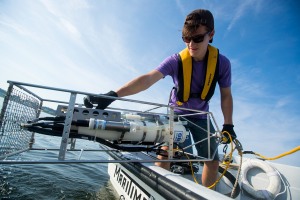PROVIDENCE, R.I. [Brown University] — As midnight approached on a recent Tuesday, Gabriella Vulakh finished documenting patient notes and got ready to head home.
Her busy shift in the critical care unit at Rhode Island Hospital included transcribing notes for the treatment of patients contending with a variety of ailments and crises, from injuries sustained from motor vehicle accidents, to falls with head injuries, to people suspected of suffering from strokes — all for which Vulakh channeled her training to painstakingly document their medical history and medical examinations at the hospital.
Vulakh, a rising Brown University senior concentrating in neuroscience, is working as a medical scribe this summer on rotation in the triage and critical care departments of Hasbro Children’s Hospital, the Miriam Hospital and Rhode Island Hospital in Providence — a set of experiences that is helping her fulfill a lifelong goal.
From a young age, Vulakh knew she wanted to make a difference by working with underserved populations. Her parents and extended family came to the U.S. from the former Soviet Union, seeking refuge from religious and political persecution.
“My family’s experience ingrained in me the importance of understanding other cultures and working with refugee communities,” she said.
